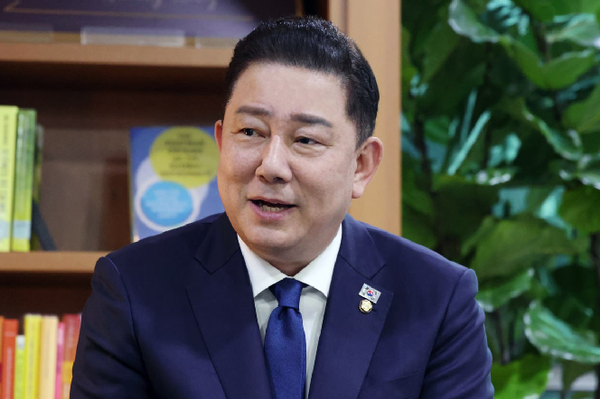
SEOUL, South Korea – Kim Byung-kee, interim leader and floor leader of South Korea's Democratic Party (DP), announced today that the resignation of Prosecutor General Shim Woo-jung marks the beginning of a "full-scale prosecutorial reform." Speaking at a Supreme Council meeting in the National Assembly, Kim asserted the Democratic Party's commitment to collaborating with the government to "seamlessly push forward" with these reforms.
Shim Woo-jung's resignation came this morning amidst intensifying political pressure and public scrutiny surrounding the prosecution's role and alleged political biases under his leadership. His departure creates a vacuum at the top of the powerful investigative body, setting the stage for significant changes promised by the ruling Democratic Party, which now holds a strong majority in the National Assembly following the recent general election.
Kim Byung-kee launched a scathing critique of Shim's parting remarks, where the outgoing Prosecutor General expressed concerns about prosecutorial reform affecting the "basic rights of the people." Shim, speaking to reporters outside the Supreme Prosecutors' Office earlier today, emphasized that "the criminal justice system is a matter directly linked to the basic rights of the people." He stressed the need for "sufficient listening to opinions from all walks of life, and deep, careful discussions" to design a criminal justice system as a "century-long plan for the nation, where frontline prosecutors can serve the people with a sense of mission."
Kim Byung-kee dismissed these concerns as "shameless," accusing Shim of hypocrisy. "It is ironic that the subject of reform is worried about reform," Kim stated. He directly challenged Shim, asking, "The person who is worried about the basic rights of the people, did you cover up the suspicions surrounding Kim Keon-hee and help the escape of the ringleader of sedition, Yoon Suk-yeol?" This refers to widespread allegations that the prosecution, during the previous administration and under Shim's influence, was lenient in investigating First Lady Kim Keon-hee concerning stock manipulation and other alleged wrongdoings. The "escape of the ringleader of sedition, Yoon Suk-yeol" is a reference to the ongoing special prosecutor's investigation into former President Yoon Suk-yeol for alleged sedition, which the Democratic Party claims was inadequately handled by the prosecution.
Kim further lambasted Shim's remarks, asserting that "before worrying about side effects, apologizing for and repenting the misdeeds of political prosecutors is the right thing to do for the people." He accused the prosecution under Shim of "trying to remove political rivals through investigations with pre-determined conclusions, inflicting great傷 and pain on the people," labeling such actions as "truly shameless." This directly targets Shim's expressed worries about reforms being pursued with "pre-determined conclusions," arguing that the prosecution itself has been guilty of such practices. The Democratic Party's proposed reforms include the separation of investigative and prosecutorial powers, a significant overhaul aimed at curbing the vast authority historically wielded by prosecutors in South Korea. This initiative, often referred to as "검찰개혁" (prosecutorial reform), seeks to prevent the concentration of power that critics argue has led to political abuse and selective justice.
The call for prosecutorial reform has been a cornerstone of the Democratic Party's platform, particularly under the leadership of President Lee Jae-myung. Kim Byung-kee reiterated this commitment, stating, "Grand societal reforms, including prosecutorial reform, began simultaneously with the inauguration of the Lee Jae-myung administration. We will certainly complete prosecutorial reform, which is an undeniable command of the people."
Beyond prosecutorial reform, Kim Byung-kee also addressed the ongoing special prosecutor's investigation into former President Yoon Suk-yeol on charges of sedition. Yoon has reportedly refused to appear for a second summons by the special prosecution team. Kim Byung-kee vehemently called for Yoon's immediate re-arrest, stating, "Former President Yoon, who has not given up on his dream of sedition, must be re-arrested immediately." This reflects the Democratic Party's persistent demand for accountability regarding Yoon's actions during his presidency, which they have characterized as an abuse of power tantamount to sedition.
Kim also urged legal action against Yoon's lawyers, accusing them of "intentionally obstructing the special prosecutor's investigation." He asserted, "The termination of sedition that the people desire is for former President Yoon and all seditious forces to properly face the solemn judgment of the law."
The special prosecution team, established to investigate the sedition allegations against Yoon, has been under pressure to demonstrate swift and decisive action. Kim Byung-kee criticized the special prosecutor's approach, particularly their statement that they would "consider requesting an arrest warrant if Yoon Suk-yeol does not appear for questioning at 9 AM on July 5." Kim deemed this measure "excessively lukewarm," demanding "swift and decisive action." This indicates a growing impatience within the ruling party for a conclusive resolution to the allegations against the former president, underscoring the high-stakes political climate surrounding these investigations.
The push for prosecutorial reform and the ongoing investigation into former President Yoon Suk-yeol are central to the Democratic Party's agenda, reflecting a broader effort to redefine the balance of power within South Korea's political and legal landscape. The resignation of Prosecutor General Shim Woo-jung is seen as a significant victory for the reformists, paving the way for the implementation of the ambitious changes they have long advocated. The coming months are expected to see intense legislative debates and potential legal battles as the Democratic Party seeks to enact its vision for a more accountable and independent justice system.
[Copyright (c) Global Economic Times. All Rights Reserved.]




























